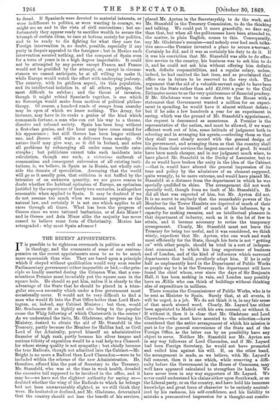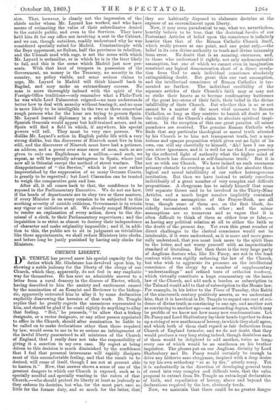THE RECENT APPOINTMENTS.
IT is possible to be righteous overmuch in politics as well as in theology, and the comments of some of our contem- poraries on the recent appointments seem to us to be much more squeamish than wise. They are based upon a principle which if obeyed without qualification would very soon render Parliamentary government either impossible or bad,—the prin- ciple so loudly asserted during the Crimean War, that a con- scientious Premier must invariably put the square man in the square hole. He should so put him, unless it is clearly to the advantage of the State that he should be placed in a trian- gular one,—a necessity which under a free government must occasionally occur. It would not be very difficult to find a man who would fit into the Post Office better than Lord Hart- ington, or, indeed, any Cabinet Minister ; but then, would Mr. Scudamore fit as tightly and also bring to the popular cause the Whig following of which Chatsworth is the centre ? As we understand the facts, Mr. Gladstone, after forming his Ministry, desired to obtain the aid of Mr. Stansfeld in the Treasury, partly because the Member for Halifax had, as Civil Lord of the Admiralty, proved himself an administrative financier of high rank, partly because his silver tongue and curious felicity of exposition would be a real help to a Chancel- lor whose strong quality is not sympathy ; but chiefly because the true Radicals, though not admitted into the Cabinet—Mr. Bright is no more a Radical than Lord Clarendon—were to be included within the scheme of the new Administration. He, therefore, offered him the post of Secretary to the Treasury. Mr. Stansfeld, who was at the time in weak health, dreaded the excessive toil supposed to be involved in the office, and it may be—we have not the slightest authority for saying so— doubted whether the wing of the Radicals to which he belongs had not been unwarrantably slighted, as we still think they were. He hesitated or declined, and Mr. Gladstone, determined that the country should not lose the benefit of his services, placed Mr. Ayrton in the Secretaryship to do the work, and Mr. Stansfeld in the Treasury Commission, to do the thinking and talking. We could put it more gracefully, we dare say, than that, but when all the politenesses have been attended to, the matter, in plain English, comes to this. Consequently, say Mr. Gladstone's enemies—and nobody ever had such talka- tive ones—the Premier invented a place to secure a 'servant. Certainly he did, and it was as certainly his duty to do it. If it was his conviction that Mr. Stansfeld was able to do effec- tive service to the country, his business was to ask him to do it, and he could not ask him without offering him definite work, definite responsibilities, and a regular salary, unless, indeed, he had omitted the last item, and so proclaimed that office was in future to be reserved to the very rich. The argument that the aid of a valuable servant ought to have been lost to the State rather than add £2,000 a year to the Civil Estimates seems to us the very quintessence of financial prudery. If Mr. Gladstone were to come down to the House with a statement that Government wanted a million for an experi- ment in spending, he would have it almost without debate ; but if he asks a few hundreds a year for an experiment in saving, which was the ground of Mr. Stansfeld's appointment, the request is denounced as monstrous. A Premier is the representative of the nation, and must be allowed, if we want efficient work out of him, some latitude of judgment both in selecting and in arranging his agents,—selecting them so that they shall most clearly accord with the general design of his government, and arranging them so that the country shall obtain from their services the largest amount of good. It would have been much cheaper, and in our judgment much wiser, to have placed Mr. Stansfeld in the Duchy of Lancaster, but to do so would have broken the unity in the idea of the Cabinet —that is, would have altered the general impression of its tone and policy by the admixture of an element supposed, quite wrongly, to be more extreme, and would have placed Mr. Stansfeld at a distance from the department in which he was specially qualified to shine. The arrangement did not work specially well, though from no fault of Mr. Stansfeld's. He did all that was expected of him, but Mr. Ayrton did not. It is no secret to anybody that the remarkable powers of the Member for the Tower Hamlets are deprived of much of their usefulness, and he himself of much of his influence, by a capacity for making enemies, and an intellectual pleasure in that department of industry, such as it is the lot of few to attain, and it became necessary to revise the temporary arrangement. Clearly, Mr. Stansfeld must not leave the Treasury for being too useful, and it was considered, we think wisely, expedient that Mr. Ayrton, who can work and work most efficiently for the State, though his forte is not " getting on" with other people, should be tried in a sort of indepen- dent command, to which his long experience of business and of London, and of the kind of influences which surround departments that build, peculiarly adapt him. If he is only half as unpleasantly hard in the Department of Public Works as people say he is at the Treasury, the department will have found the chief whom, ever since the days of Sir Benjamin Hall, it has been seeking in vain, and London may possibly have an Adile who can think of buildings without thinking also of expenditure in millions.
There remains the Commissioner of Public Works, who is to be sent as Minister to Spain. Surely that, at all events, it will be urged, is a job. We do not think it is, in any fair sense of that much abused word. Clearly, Mr. Layard has either been appointed to Madrid with his own consent, or without it. If without it, then it is clear that Mr. Gladstone and Lord Clarendon—who must have assented to the selection—have considered that the entire arrangement of which his mission is part is for the general convenience of the State and of the Foreign Office, as the latter can by no possibility have any object to serve. Neither Mr. Stansfeld nor Mr. Ayrton are in any way followers of Lord Clarendon, and if Mr. Layard had been Foreign Secretary, he would not have promoted and exiled him against his will. If, on the other hand, the arrangement is made, as we believe, with Mr. Layard's full consent, then it is one which, while removing a diffi- culty before the Government in the House of Commons, may well have appeared calculated to strengthen its hands. We have never been in any way supporters of Mr. Layard. We never could understand his claims either upon Southwark, or on the Liberal party, or on the country, and have held his immense knowledge and great force of character to be entirely neutral- ized by his rashness, his self-confidence, and his liability to mistake a preconceived impression for a thought-out conclu- sion. That, however, is clearly not the impression of the chiefs under whom Mr. Layard has worked, and who have means of estimating the value of their subordinates denied to the outside public, and even to the Services. They have held him fit for any office not involving a seat in the Cabinet, and we can, though outsiders, readily understand why he was considered specially suited for Madrid. Constantinople with the Boys uppermost, no Sultan, half the provinces in rebellion, and the Ulemah mad with rage, is not the scene with which Mr. Layard is unfamiliar, or in which he is in the least likely to fail, and this is the scene which Madrid just now pre- sents. With that knot of troopers in possession of the Government, no money in the Treasury, no security in the country, no policy visible, and some serious claims to urge, Mr. Layard in Madrid will think himself back in Bagdad, and may make an extraordinary success. No man is more thoroughly imbued with the spirit of the Foreign-Office traditions—only remember what a Philo-Turk he was while Lord Palmerston reigned—no man understands better how to deal with anarchy without fearing it, and no man is more likely to be intelligible to the two or three somewhat rough persons who for the hour are trying to govern Spain. Mr. Layard learned diplomacy in a school in which these Spanish Generals would appear but half-trained actors, and in Spain will find a field in which, if anywhere, his special powers will tell. They must be very rare powers. We dislike Mr. Layard's action in English public life with a very strong dislike, but the discoverer of Nineveh must live in him still, and the discoverer of Nineveh must have had a patience, an address, and a power over some races of men, such as are given to only one Englishman in a million,—and such, we repeat, as will be specially advantageous in Spain, where just now all is Oriental except the method of street warfare. The disappointment of " the Service," which is just now rather impoverished by the suppression of so many German Courts, is greatly to be regretted ; but Lord Clarendon can be trusted to weigh the comparative gain and loss.
After all, it all comes back to that, the confidence to be reposed in the Parliamentary Executive. We do not see how, if the heads of departments are to obey two or three masters, if every Minister is on every occasion to be subjected to this scathing severity of outside criticism, Government is to retain any vigour or initiative at all. We already compel Ministers to render an explanation of every action, down to the dis- missal of a clerk, to their Parliamentary supervisors ; and the inquisition is so strict as almost to destroy their independence of character and make originality impossible ; and if, in addi- tion to this, the public are to sit in judgment on trivialities like these appointments, we shall reduce Ministers into clerks, and before long be justly punished by having only clerks for Ministers.































 Previous page
Previous page